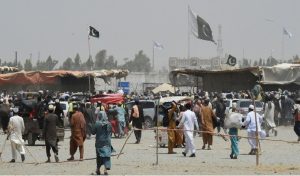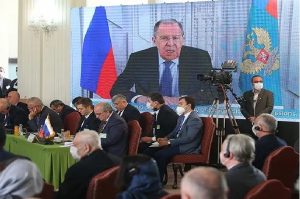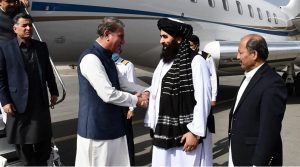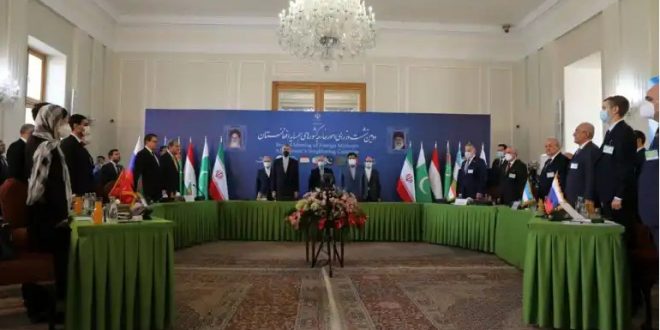28-10-2021
By SJA Jafri + Bureau Report + Agencies
 TEHRAN/ KABUL/ ISLAMABAD: Senior officials of Afghanistan’s neighboring states have gathered in Iran’s capital for a one-day conference to discuss the situation in the Taliban-ruled country.
TEHRAN/ KABUL/ ISLAMABAD: Senior officials of Afghanistan’s neighboring states have gathered in Iran’s capital for a one-day conference to discuss the situation in the Taliban-ruled country.
The foreign ministers of Iran, Pakistan, Tajikistan, Uzbekistan and Turkmenistan met on Wednesday in Tehran, joined by their counterparts from China and Russia via video link.
Iranian First Vice President Mohammad Mokhber inaugurated the meeting, replacing President Ebrahim Raisi who was unable to do so due to “another urgent priority”. The conference came a day after Iran’s online petrol distribution software was hacked in a massive cyber-attack that affected petrol stations across the country.
Mokhber told the conference that the “defeat of American policies” in Afghanistan does not mean that the United States is abandoning its “destructive” policies across the region.
ISIL (ISIS), which Mokhber referred to as the “US proxy force in the region”, has now targeted security in Afghanistan with the aim of instigating a civil war, he added.
 He was followed by the United Nations chief, Antonio Guterres, who said in a video link address recorded in New York that Afghanistan is facing an “epic humanitarian crisis” which demands immediate action. He said the UN is engaging the Taliban, which has so far provided access, to deliver humanitarian relief to people.
He was followed by the United Nations chief, Antonio Guterres, who said in a video link address recorded in New York that Afghanistan is facing an “epic humanitarian crisis” which demands immediate action. He said the UN is engaging the Taliban, which has so far provided access, to deliver humanitarian relief to people.
Guterres also said he is “deeply disturbed” by violations of human rights and attacks in the country since the Taliban takeover, and called for efforts to “combat terrorism” and drug trafficking.
All seven foreign ministers delivered a public address before retreating to a private meeting to agree on a joint statement.
They all welcomed the conference and emphasized on the necessity of continued cooperation by the neighboring states to avoid a collapse or civil war in Afghanistan, which would have severe ramifications for the region and beyond.
Chinese Foreign Minister Wang Yi expressed willingness for hosting the next meeting at a yet  undecided time. Wednesday’s talks follow a virtual meeting in early September between the foreign ministers that were hosted by Pakistan.
undecided time. Wednesday’s talks follow a virtual meeting in early September between the foreign ministers that were hosted by Pakistan.
Yi said senior Taliban officials had told him during a recent meeting in Qatar’s capital, Doha, that the group “takes seriously the cause of the international community” and is ready to take positive action.
“My overall impression is that the Taliban is eager to have dialogue and cooperation with the outside, and that they are serious about this,” he said.
Yi and Iranian Foreign Minister Hossein Amirabdollahian also called on the US to lift its unilateral sanctions affecting Afghanistan, saying the failing Afghan economy requires extensive support.
The conference also saw an emphasis on the need to form an inclusive government in Afghanistan. The participants further backed humanitarian relief for the population, as much as 90 percent of whom could fall below the poverty line by next year if the current situation continues.
 More support by international organizations, including the UN and the World Health Organization, was underlined by the participants to combat the COVID-19 pandemic and other health and humanitarian issues in Afghanistan.
More support by international organizations, including the UN and the World Health Organization, was underlined by the participants to combat the COVID-19 pandemic and other health and humanitarian issues in Afghanistan.
Iran’s position
Iran has maintained its official position calling for an “inclusive” government in Afghanistan even after the Taliban announced the formation of an administration that does not represent ethnic and religious groups or women.
Iran’s foreign ministry has also harshly condemned the Taliban’s armed assault against opposition fighters in the Panjshir Valley, and a series of recent deadly explosions claimed by the Islamic State in Khorasan Province, ISKP (ISIS-K) armed group that have rocked Afghanistan.
During his address at Wednesday’s conference, Iranian Foreign Minister Amirabdollahian said Afghanistan is now “considerably far” from reaching a political condition that is acceptable to all Afghan people and groups.
 “The timing of officially recognizing the new governance situation in Afghanistan depends on how fast an inclusive government is formed in the country,” he said, adding that Afghanistan’s independence and rejection of direct foreign intervention are also essential and that the Taliban must guarantee Afghan soil will not present a threat to other countries.
“The timing of officially recognizing the new governance situation in Afghanistan depends on how fast an inclusive government is formed in the country,” he said, adding that Afghanistan’s independence and rejection of direct foreign intervention are also essential and that the Taliban must guarantee Afghan soil will not present a threat to other countries.
“Neighboring states are expected to use all their influence over Taliban leaders, and also other Afghan sides, to encourage collective participation in forming a government, and to facilitate this process,” Amirabdollahian said.
Before the withdrawal of the US-led foreign forces from Afghanistan in August, Tehran hosted intra-Afghan talks that included the Taliban earlier this year.
Iran has said it remains in constant contact with all parties in Afghanistan, including the Taliban.
A Taliban commerce official recently announced the group is eager to buy oil from Iran and hopes its western neighbor grants the request to help address Afghanistan’s fuel shortages.
 Pressmediaofindia
Pressmediaofindia




